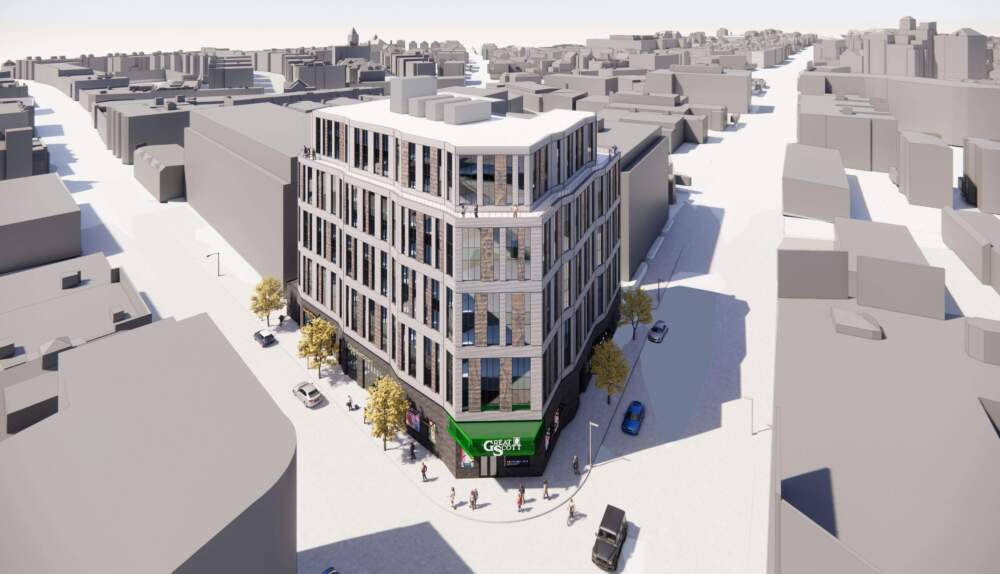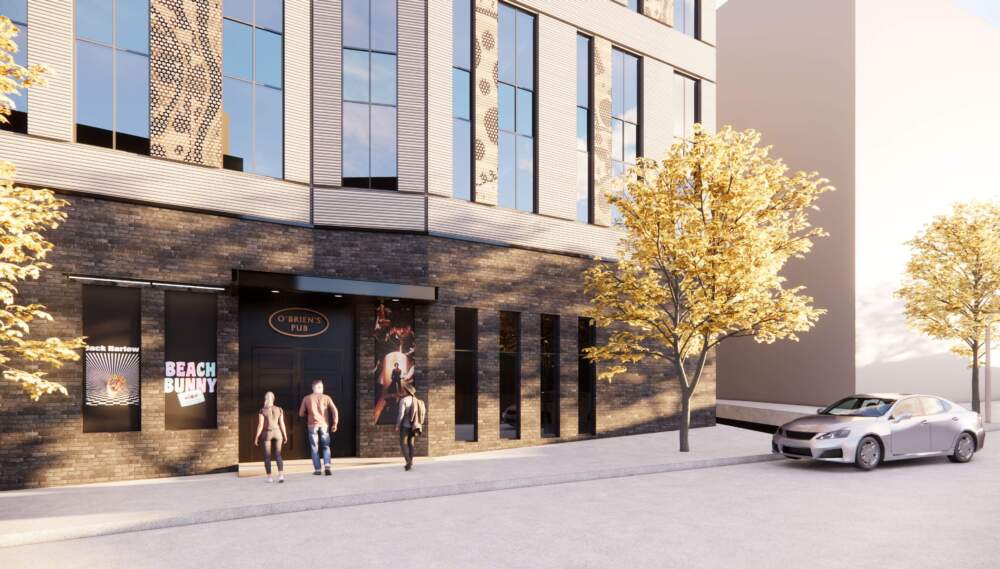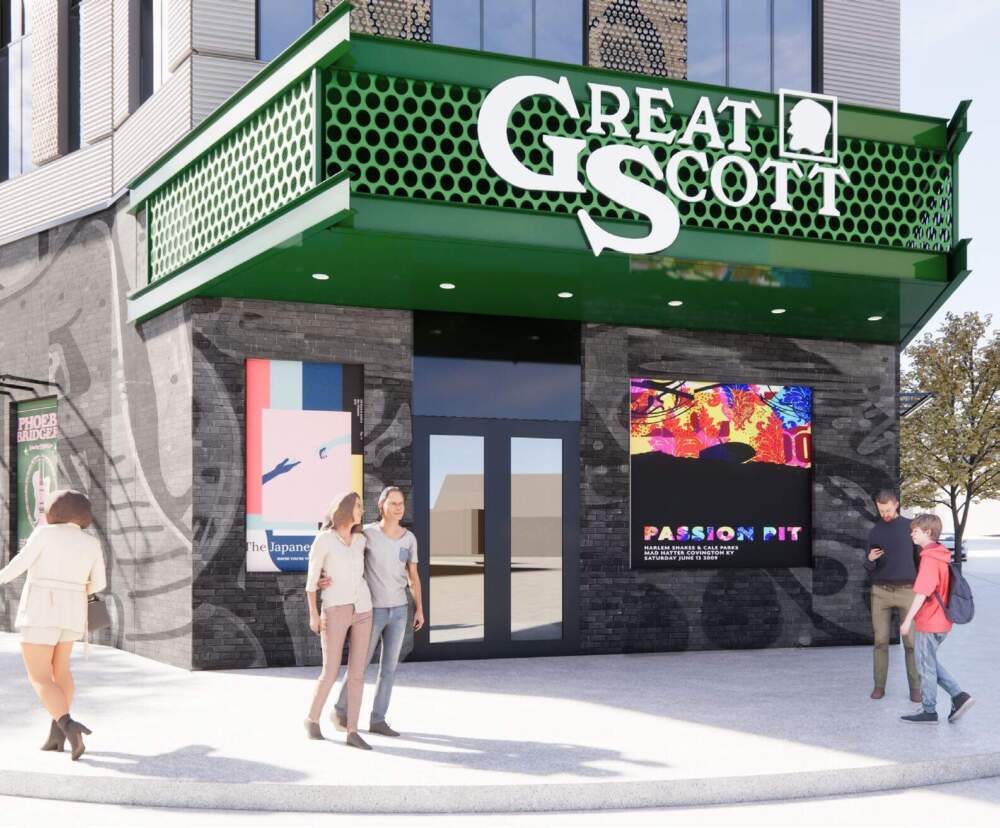Advertisement
New plan for a resurrected Great Scott comes with housing

Allston’s atrophied “Rock City” might get its beating heart back — and Bostonians seem to be all in.
Legendary live music club Great Scott, shuttered by the pandemic since May 2020, is being reimagined down the street from its original location. This time, live music comes with new housing.
The city invited the public to submit written comments about the plan, and nearly all of the 372 comments that were filed voiced support for it. Many reminisced about the shows they saw over the years at Great Scott, where artists such as local bands Pile and Speedy Ortiz, Phoebe Bridgers, MGMT and Grimes have all played.
“Our business model, where we are the landlord and the tenant, is a great model to bring this back and make sure that it lasts for the long term,” said Jordan Warshaw, one of the project’s three developers.
The plan calls for Great Scott to be resurrected in the former Stingray Body Art at 1 Harvard Ave., next to the club’s old sister venue O’Brien’s Pub. The developers bought those buildings as well as a recording studio and two-story home on the same block. They plan to demolish all of them and erect a nine-story building that would put 139 apartments above the two clubs.

Warshaw said the team expects to break ground six to eight months after approval, which they hope they will get this spring. Construction of the two music venues is expected to take at least a year and the apartments about 18 months.
Many Boston-area music venues have died in recent years, like Rockwood Music Hall’s abrupt closure in Fenway last year and Atwood’s Tavern in East Cambridge in 2023. Great Scott’s original spot at 1222 Commonwealth Ave. is now a Taco Bell Cantina.
With a 300-person capacity, the new Great Scott would hit the Goldilocks niche of music venues — not too big, not too small — that local musicians and music fans say Boston severely lacks. Plus, a green room would be available for artists to relax in before and after shows, complete with showers and laundry machines, something the old venue never had. O’Brien’s Pub would be rebuilt with a stage and a capacity of 75 people.
Above the new Great Scott, separated by an acoustical barrier, 115 studio apartments and 24 one-bedroom units would rise nine floors high at the entrance of Allston, where Harvard Avenue and Cambridge Street meet. About 24 units would be designed as affordable. The building would have no parking except three ride-sharing spots and 209 spaces for storing bikes.
Advertisement
Carl Lavin, who booked shows for Great Scott from 2003 until its closing, crowdfunded $300,000 to save the venue. To make the revival a reality, Lavin partnered with Paul Armstrong — producer of the Boston Music Awards, publisher of online music magazine Vanyaland and CEO of the media company Redefined — and Warshaw, president of the Noannet Group, who provides real estate expertise.
The Great Scott redevelopment proposal is in the review stage, during which the developers get feedback from the public and the city agencies that measure and regulate the project’s impact. It needs the approval of Boston’s transportation, planning, and fire departments as well as its Interagency Green Building Commission.

A document with public comments from the project’s 39-day comment period was published on the city’s website in mid-March. Responses were sorted into three categories: “support,” “oppose” and “neutral.” An overwhelming majority voiced support. Of 372 entries, 362 were in support, six in opposition and four neutral.
“We’ve got a lot of support,” Warshaw said, “and we’re hoping that we will make it to the board approval stage very soon, and then get into the agreement stage very soon after that.”
One email of support came from Jonathan Gruber, an MIT economics professor, who said he is a passionate live music fan.
“As an economist, I think that having a reopened Great Scott will be a major economic contributor to the area,” Gruber wrote. “As a music lover, I know it will make many Boston area residents lives much richer.”
Gruber wrote that Great Scott was a “vital part” of his history in Boston, and that he contributed to Lavin’s fund to help save the venue.
Another supporter, Kristofer Thompson, wrote, “I’m just a library assistant at Tufts University, but I personally invested $3,000 in their plan because I couldn’t imagine the Boston scene without Great Scott in it.”
Opposition to the project cited concerns about traffic congestion, the lack of parking, and gentrification and “yuppification” — the process of making neighborhoods more attractive to young urban professionals. Some complained expecting a high cost of concert tickets, or said they worried that the new Great Scott would lack the original’s grittiness.
Great Scott’s developers presented the project at a virtual public meeting hosted by the Boston Planning Department in late February, where many local musicians said the city’s music scene is in dire condition and needs a place like Great Scott.
Dan Moffat, a sound engineer and lead vocalist and guitarist for The Collect Pond band, attended the meeting and said the project must happen. What is left of the music venues still standing in the area is at best “flimsy,” he said, and the similarly sized Deep Cuts, a brewery and live music venue in Medford, is too far away.

“I gotta cross two rivers to get there,” he said. “We need stuff where people are.”
Moffat said Great Scott has “so much goodwill and street cred” to cash in after 44 years, which will pay off with great lineups “night after night.”
“People are going to be climbing over themselves to want to play a venue like that, so the booker is going to have their pick,” he said.
Babak Veyssi, owner of the Peridot apartment building next door, came forward in the meeting to oppose the project. Veyssi said although he is pro-development, he will do everything he can to stop the project because the nine-story building would cast a shadow that would “chill” his 32-unit building.
Cullen Deimer, a housing advocate with the recently formed Allston Brighton Housing Action who attended the virtual meeting, called it “the perfect project” that addresses both the city’s housing crisis and Allston’s live-music attrition.
Concerns over the project’s lack of parking don’t bother Deimer, who lives in Brighton with his wife and without a car.
“A lot of people just like having their affordable, livable unit, close to all the things they need to go to,” he said, “and they don’t need too many more bells and whistles on top of that.”
This story is part of a partnership between WBUR and the Boston University Department of Journalism.